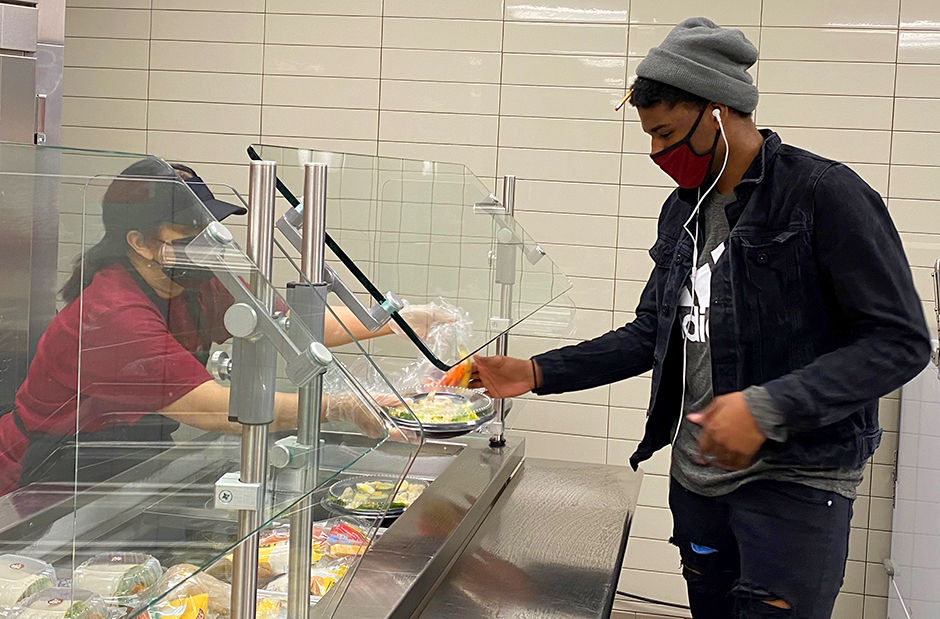
Richfield Public Schools is the first K-12 district in the country pledging to offer plant-based food options
It started at the snack bar. When Jodi Gruhn’s kids came in from the playing field, she wanted to be able to offer them healthy, tasty food options — but their choices were severely limited.
“I was appalled when my kids were doing sporting events to see what kind of food was there for athletes and parents,” Gruhn said. “There were not very many plat based options for K-12 available — just blue slushies and hot dogs.”
Those options were bad enough, but Gruhn’s two children don’t eat meat, so that meant that there was often nothing available to them after the big game. And she wasn’t just concerned about her own kids’ snack choices: “Every kid should have an option of being able to choose an apple or an orange or a hot dog that is not meat-based.”
Gruhn’s desire for more options eventually grew to encompass all food choices available to kids at her children’s school. While her kids’ plant-based diets are ecologically motivated, Gruhn knew that many other children in their school had other reasons to want options.
She began volunteering for Wholesome Minnesota, a program created by the nonprofit Compassionate Action for Animals that encourages schools and other institutions in the state to provide plant-based food options for their students and employees. And this spring, she was hired as Wholesome Minnesota’s coordinator. “The idea around the program is to build awareness about the health, environmental and cost benefits of increasing the number of plant-based foods in institutions in Minnesota,” Gruhn said.
As part of her work, Gruhn and her team of volunteers talk to school food-service staff about the Forward Food Pledge, a program created by the Humane Society of the United States, to encourage food providers in K-12 schools to commit to increasing the percentage of plant-based food offerings in their schools.
One of those people Gruhn spoke with was Michael Manning, director of food and nutrition at Richfield Public Schools, whose interest in the program was based on what he was hearing from students. “Students and their families had been asking us for healthier food options,” Manning said. “They want more culturally appropriate food — and many of those options are already plant-based.”
This summer, Manning signed the Forward Food Pledge, and began rolling out plant-based options in the fall, making Richfield Public Schools the first K-12 district in the county to commit to the program. “It seemed like a good idea, so I signed up and committed to do it,” Manning explained. “They provided us with recipes to help us get the program up and running.”
He said he’s excited to incorporate more plant-based foods into the district’s rotating list of menu options. The district has committed to meeting the 20 percent mark by 2024.
Manning said that he and his staff have committed to, “Twenty percent of the main entrees, or at least one item a week, will be plant-based. We plan to run the new dishes two times, and if a dish isn’t acceptable to our kids, we’ll end up running something else.”
Listening to students
Sonny Rodriguez, the Humane Society of the United States food service innovation team coordinator, said that his organization created the Forward Food Pledge in response to what they were seeing as a growing desire among young people to eat more sustainable foods. “Many K-12 schools, universities and hospitals were saying they wanted to expand what they are offering in the plant-based realm,” Rodriquez said. “We thought we’d put together the resources to help that transition.”
Much of the interest seemed to be coming from younger people, Rodriguez added. “They are more focused on sustainable options. They are taking the charge as far as plant-based foods.”
Manning said he sees that trend in his own workplace. “We have a Green Team on campus. … We started composting in the high school cafeteria. Our student body is very health conscious. They pay a lot of attention to environmental issues.”
When he was growing up in Mississippi, Manning said that he and his fellow students rarely questioned the kind of food that was served in their school cafeteria. “We just came in and ate,” he said. But it’s a different story today: “With the internet and popular culture, kids understand more. They are asking more questions.”
Gruhn appreciated how Manning embraced her ideas and was enthusiastic about trying new recipes. “I think Michael looks at this as an opportunity to bring to his students something that they are asking for.”
Richfield is home to families from around the world, Manning said. “We have a large Latino population, a growing Somali population, a decent amount of Indian students. This is a diverse population, which makes it fun for us.”
Manning said that he and his staff are committed to offering food options that represent all of the cultures of the student body. Many of those foods just happen to be plant based. “When you look outside a ‘normal’ American diet, you discover that many dishes don’t include meat,” he said. Manning and his team are already offering a few options: “There’s a black-bean burrito bowl, lo mein, chana masala.”
Not all school food-service directors have embraced Forward Food as enthusiastically as Manning has, Gruhn said. While she is getting some requests for recipes, she added, “There hasn’t been the full-on embrace like Michael’s.”
Rodriguez said that he and his colleagues try to emphasize that offering more plant-based options to meal plans is actually adding more options for students, not taking them away. “It’s important to make it known throughout the school that these changes are being made for a positive reason,” he said.
Saying food choices are “meatless” or “meat-free,” can actually send a message of deprivation, he said; it’s better to emphasize what’s being gained, instead of what’s being lost: “When schools put these menu options in the line, we want to give it a good feel, to say, ‘These are the reasons we’re doing this. We are doing it for the sustainability aspects, the health benefits.’”
One upside, Manning said, was that with so many goods and industries affected by supply-chain shortages, plant-based food options so far seem to be easier to come by. “When you start looking at the recipes, you realize that the products you need aren’t the things that we’ve seen strains in supply chains with,” he said. “Everyone’s ordering chicken nuggets. We’re ordering some chickpeas, some black beans. They’re much easier to get.”
Now that students are back in school full-time, Manning said that his staff is excited to try out the new recipes. “We feed students breakfast and lunch every day. In some cases, these may be the best — or even the only — meals they get. So it’s fun to be able to give them options. It’s great to see their faces again, and it’s great to offer them good food.”
Click here to view original web page at Richfield Public Schools is the first K-12 district in the country pledging to offer plant-based food options
Also Read: 5 Environmental Benefits of Eating Whole Foods and Plant Based Protein


